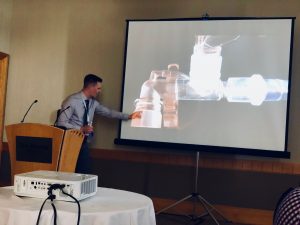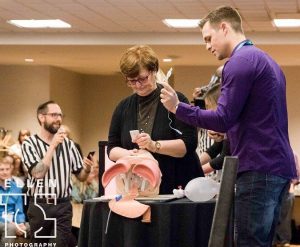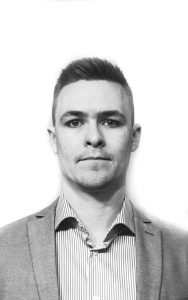An interview with Sebastien Tessier.
With a passion for finding solutions and figuring out answers to complex problems, Sebastien Tessier initially had plans to attend university to study engineering in either biomedical or mechanical fields. However, thanks to a presentation by a neonatal Respiratory Therapist (RT) during his high school years, he decided to pursue Respiratory Therapy. “It was only fitting that working with complex lifesaving equipment would help fulfill that passion.”, shared Sebastien.
I had the opportunity to meet, and attend a presentation by Sebastien, at the Vancouver Canadian Society of Respiratory Therapists (CSRT) Conference in 2018. He is dedicated and driven to advance our profession. I was lucky that he agreed to answer few questions for this interview, even though he was in another country and on vacation.
With various roles and years of experience, what are some of your memorable roles so far?
I think the most memorable roles are the ones that have a deep impact on you as a growing individual. I’ve been able to advocate for French language post-secondary education in the healthcare field to members of parliament. Where this may have been memorable, it will never replace my time as a student in a pediatric code being the only person able to communicate with family. I’ve also served a national student association as President supporting and facilitating interprofessional education across the country. It’s the people, the passion and the longstanding professional relationships that made this such a memorable experience. This can easily be said from my time volunteering on the board of directors for the regulatory college and chairing the provincial conference. The roles are just titles, the experiences you have and how you evolve with them are what makes them memorable.

Your work and volunteering experience include leadership positions, including but not limited to being on the board for the professional college in Manitoba, chairing the committee for the annual MARRT conference, and involvement with other organizations such as CSRT. Can you tell us a little more about this. How did you get involved with the non-clinical side of RT? Also, what were some areas that you had to grow and improve on to better serve in these leadership roles?
It’s a bit interesting as I always considered myself an introvert growing up. Yet, as an RT, you quickly learn that you have to speak up, being the one at the head of bed and managing airways and all. This is where I first struggled but quickly championed, becoming an extroverted introvert. Is that a thing? I am incredibly passionate, as I’m sure you can appreciate from our past encounters. It can be considered an attribute, but I sometimes see it as a fault, because if I don’t have the answer, I can guarantee you I’ll be spending endless hours trying to figure it out. It all didn’t go unnoticed and I was invited to meet with others that shared similar passions. Being exposed to other initiatives outside of clinical had me engaged and invested. My goal as an individual is to contribute something that goes beyond the bedside. I am incredibly thankful for the impact we have on individuals lives and their families (families are also just as important), but for some reason it just isn’t enough for me. I want to be able to have a positive impact directly and indirectly. Again, probably another fault of mine.
Your clinical experiences include working with newborns, pediatrics, and adults. What has helped you become an effective RT in these various patient populations? Also, what advice do you have for RTs who want to expand their skillset and knowledge to work with different patient populations?
I think the biggest impact comes from experience. It’s not to say that I’ve seen everything there is to know about the profession. How you process the experiences you have is what will make a good RT in every scope of our profession. Experience doesn’t just come from you, it derives from successes and failures of others, research and evidence-based care, conferences and networking opportunities where we connect with each other. The one piece of advice I have for those interested in working with different patient populations comes from paper that I sadly wasn’t able to locate and reference for this post, but here it is (roughly): “We often fail to understand the ventilation applied to the lung. The best way one can appreciate the pressures experienced in another’s lung is to experience it themselves.” Also known as, blowing air into another person’s lungs or mouth to mouth.
Any advice for RTs and volunteering? How would one approach an organization they are interested to volunteer at?
I’m a strong believer that those who succeed at what they do, are able to do so in an environment that fosters and supports them. This means that those that are interested in being involved need to acquaint themselves with those that are involved. There is never anything wrong with reaching out to someone with an honest question. I don’t think I know anyone that would turn someone down that is interested in getting involved. I’ve oddly enough had RT’s ask the very question and have been happy to help. Again, I don’t always have the answers but can surely get them on track to where they want to go. This creates a network that is so powerful in the RT world, you’ll never look back.
Let me ask you a question about the bigger image. What is the next big growth area that you see for the RT profession?
Another tough one. I feel that the profession has grown so much in the last five decades. RT’s went from being technical to therapeutic. We used to be able to work in all areas of the hospital and now that each of those areas has become a world of its own, its hard to keep up. Academically, I think I’ve seen this in a few of your interviews, we are due to contribute more to evidence-based care. Not by practice, but by leading with research in our area of expertise. Lastly, I think this goes beyond the scope of your question, but I have this vision of the future where we don’t really ventilate patients at all. Ventilation is so abusive to the lung, which is why there’s so much emphasis on protective strategies and if we don’t need to be intubated… we extubate. What if ventilation wasn’t the life saving measure it is today?
I am always interested in people’s sources of inspiration and role models. What can you share with me?
I think my biggest inspirations are those that are working closely around me. There are a lot of good people working within the profession, clinicians, researchers, managers and beyond. I particularly look back to others success as an inspiration. It is all a matter of environment, and everyone that I’ve looked up to say the same thing. They work in a place of encouragement, where they are able to contribute and allow their passions to grow indefinitely.
How have you been successful in creating a work-life balance? How do you effectively deal with stress related to work? Any advice for RTs to better achieve physical and psychological wellness?
It’s not easy. I honestly cannot say that I have mastered the work-life balance. I’m still writing emails and doing school work while on vacation as I write this to you. Part of me wants to just put it all away, the other part of me just doesn’t want to shut off. I’m thankful that I have good people looking out for me and they help keep things in check. If you can’t admit the truth to the matter you will never be able to reflect and appreciate where you are in life.
We work with people everyday, in all aspects of life. Being personable to patients, colleagues and families I think is what takes a lot of the stress away. Being able to have difficult conversations with others rather than keeping them to ourselves. If you forgot something or did something that needs to be addressed, you will feel 100% better answering the doubt in your mind than wondering when you’ve gone. I feel that we are able to have a better appreciation of ourselves, by taking the time to reflecting. Taking a look at the big picture goes a long way. Sometimes it even takes a large blank canvas (or whiteboard) to put all your thoughts out there.
Any final thoughts?
I do want to thank you Farzad for taking the time in providing RT’s with different perspectives from different people. I always feel like learning from others is enriching because they offer a completely outside perspective. For those that don’t have the opportunity to either network at conferences or via different organizations can hopefully appreciate the insight you are providing them with this blog. I never write about myself in this manner, it is a bit challenging to share the same passion you have in person over a keyboard. But it did allow me to reflect and appreciate where I am, what I’m doing and where I’m going. So for that, thank you.
Thank you, Sebastien, for taking the time to answer my questions and to share your insights and experiences with the RT community!


 Sebastien Tessier
Sebastien Tessier